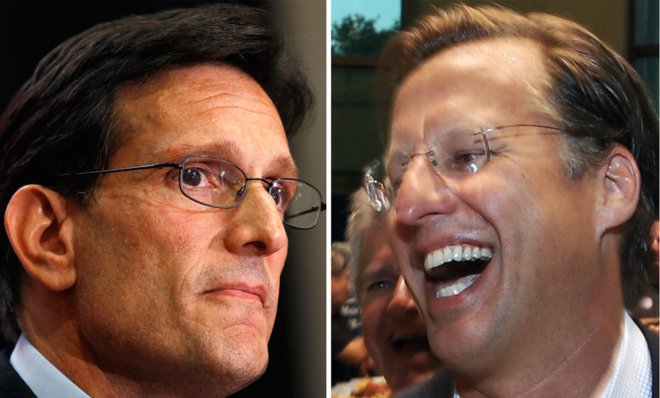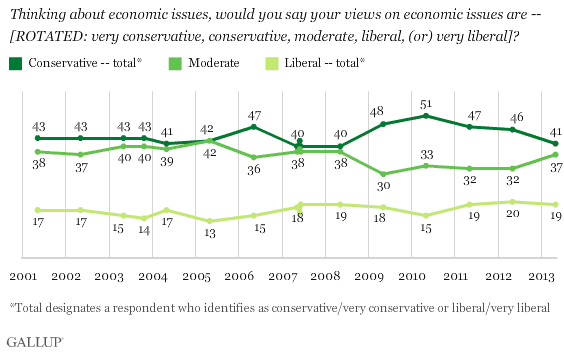Yes, the Tea Party beat Eric Cantor. But it still isn't winning.
House Majority Leader Eric Cantor's loss was a huge scalp for the conservative GOP insurgency. But what's the endgame?


A free daily email with the biggest news stories of the day – and the best features from TheWeek.com
You are now subscribed
Your newsletter sign-up was successful
Tuesday night belonged to the Tea Party. The big news from yesterday's primaries is that House Majority Leader Eric Cantor (R-Va.) was soundly defeated, 56 percent to 44 percent, by an underfunded, no-name Tea Party primary challenger, David Brat, an economics professor at a college most people have never heard of (Randolph-Macon College, in Ashland, Va.).
On the face of it, this is madness on the part of Republican voters and a pyrrhic victory for the Tea Party. It's not that the GOP is likely to lose the conservative district to the Democratic nominee, fellow Randolph-Macon professor Jack Trammell. But Republicans in Virginia's 7th Congressional District just traded the influence and perks of being represented by the No. 2 person in the House — tipped to be future House speaker, no less — for a powerless freshman backbencher. And they also removed from Washington a politician hated by none other than Tea Party bête noire President Obama and other Democrats.
Nonetheless, unseating Cantor was a big victory for the RINO-hunting wing of the GOP — even though, as Slate's David Weigel notes, Cantor is a conservative stalwart who was until recently viewed as a Tea Party champion. Why did his constituents turn on him?
The Week
Escape your echo chamber. Get the facts behind the news, plus analysis from multiple perspectives.

Sign up for The Week's Free Newsletters
From our morning news briefing to a weekly Good News Newsletter, get the best of The Week delivered directly to your inbox.
From our morning news briefing to a weekly Good News Newsletter, get the best of The Week delivered directly to your inbox.
The theory being pushed by Brat and his backers on conservative talk radio is that Cantor was too willing to pass an immigration reform bill that would open a path to citizenship, especially for law-abiding immigrants brought here as children. Mark Z. Barabak at the Los Angeles Times pretty persuasively argues that Cantor made the two cardinal political sins of putting his political ambitions ("first Jewish president in U.S. history!") ahead of his constituents and underestimating his opponent until it was too late.
If Cantor had sailed to victory, as expected (by just about everyone, including national Tea Party groups), the big story of the night would have been the trouncing Sen. Lindsey Graham (R-S.C.) delivered to a handful of Tea Party challengers, winning 59 percent of the vote to their collective 41 percent.
The storyline would have been that the Republican establishment was soundly defeating the Tea Party — the defeat of Texas Lt. Gov. David Dewhurst and the runoff for Sen. Thad Cochran (R-Miss.) notwithstanding — and that, perhaps this time, for real, the Tea Party was gasping its last breath. Now the conventional wisdom is that if a powerful conservative like Cantor can fall, no Republican is safe from a Tea Party challenge. In other words, the old is new again.
And it's probably a true message. The Tea Party loses just about every national policy fight, but it is steadily transforming the Republican Party through this tactic: Push the party to the right by threatening to unseat any incumbent who is insufficiently conservative, too willing to compromise, or inclined to put small policy victories over pure principle. It has been a very effective strategy. But it only really works for a party that's out of power.
A free daily email with the biggest news stories of the day – and the best features from TheWeek.com
How does this play out? Let's speculate: If the GOP keeps the House this fall, as expected, and wins the Senate, as seems plausible, the next battle is for the presidency in 2016. To get there, Republicans would probably have to do something to convince the country to trust them, something other than saying no to Obama and the Democrats.
But here's the bigger problem for the Tea Party, assuming it wants to be more than a protest movement. The further it pushes the GOP to the right, the less palatable the party will be to the general electorate. The Tea Party's most politically advantageous stand is on fiscal conservatism. Yet even there, the most recent Gallup polling shows that while a plurality of Americans consider themselves economic conservatives, the numbers aren't enough to win a popular election:

The numbers are worse on social conservatism:
Pew's polling is roughly in line with Gallup's.
Establishment Republicans want to win, even if it means winning over some moderate voters. The Tea Party wants to win, but only on its own terms — a much riskier proposition. As the string of statewide establishment GOP victories this season shows, Republican voters seem to be leaning toward the former strategy. With a living, active Tea Party breathing down their necks, Republican politicians have some hard choices to make.
Peter has worked as a news and culture writer and editor at The Week since the site's launch in 2008. He covers politics, world affairs, religion and cultural currents. His journalism career began as a copy editor at a financial newswire and has included editorial positions at The New York Times Magazine, Facts on File, and Oregon State University.
-
 One great cookbook: Joshua McFadden’s ‘Six Seasons of Pasta’
One great cookbook: Joshua McFadden’s ‘Six Seasons of Pasta’the week recommends The pasta you know and love. But ever so much better.
-
 Scientists are worried about amoebas
Scientists are worried about amoebasUnder the radar Small and very mighty
-
 Buddhist monks’ US walk for peace
Buddhist monks’ US walk for peaceUnder the Radar Crowds have turned out on the roads from California to Washington and ‘millions are finding hope in their journey’
-
 The billionaires’ wealth tax: a catastrophe for California?
The billionaires’ wealth tax: a catastrophe for California?Talking Point Peter Thiel and Larry Page preparing to change state residency
-
 Bari Weiss’ ‘60 Minutes’ scandal is about more than one report
Bari Weiss’ ‘60 Minutes’ scandal is about more than one reportIN THE SPOTLIGHT By blocking an approved segment on a controversial prison holding US deportees in El Salvador, the editor-in-chief of CBS News has become the main story
-
 Has Zohran Mamdani shown the Democrats how to win again?
Has Zohran Mamdani shown the Democrats how to win again?Today’s Big Question New York City mayoral election touted as victory for left-wing populists but moderate centrist wins elsewhere present more complex path for Democratic Party
-
 Millions turn out for anti-Trump ‘No Kings’ rallies
Millions turn out for anti-Trump ‘No Kings’ ralliesSpeed Read An estimated 7 million people participated, 2 million more than at the first ‘No Kings’ protest in June
-
 Ghislaine Maxwell: angling for a Trump pardon
Ghislaine Maxwell: angling for a Trump pardonTalking Point Convicted sex trafficker's testimony could shed new light on president's links to Jeffrey Epstein
-
 The last words and final moments of 40 presidents
The last words and final moments of 40 presidentsThe Explainer Some are eloquent quotes worthy of the holders of the highest office in the nation, and others... aren't
-
 The JFK files: the truth at last?
The JFK files: the truth at last?In The Spotlight More than 64,000 previously classified documents relating the 1963 assassination of John F. Kennedy have been released by the Trump administration
-
 'Seriously, not literally': how should the world take Donald Trump?
'Seriously, not literally': how should the world take Donald Trump?Today's big question White House rhetoric and reality look likely to become increasingly blurred
